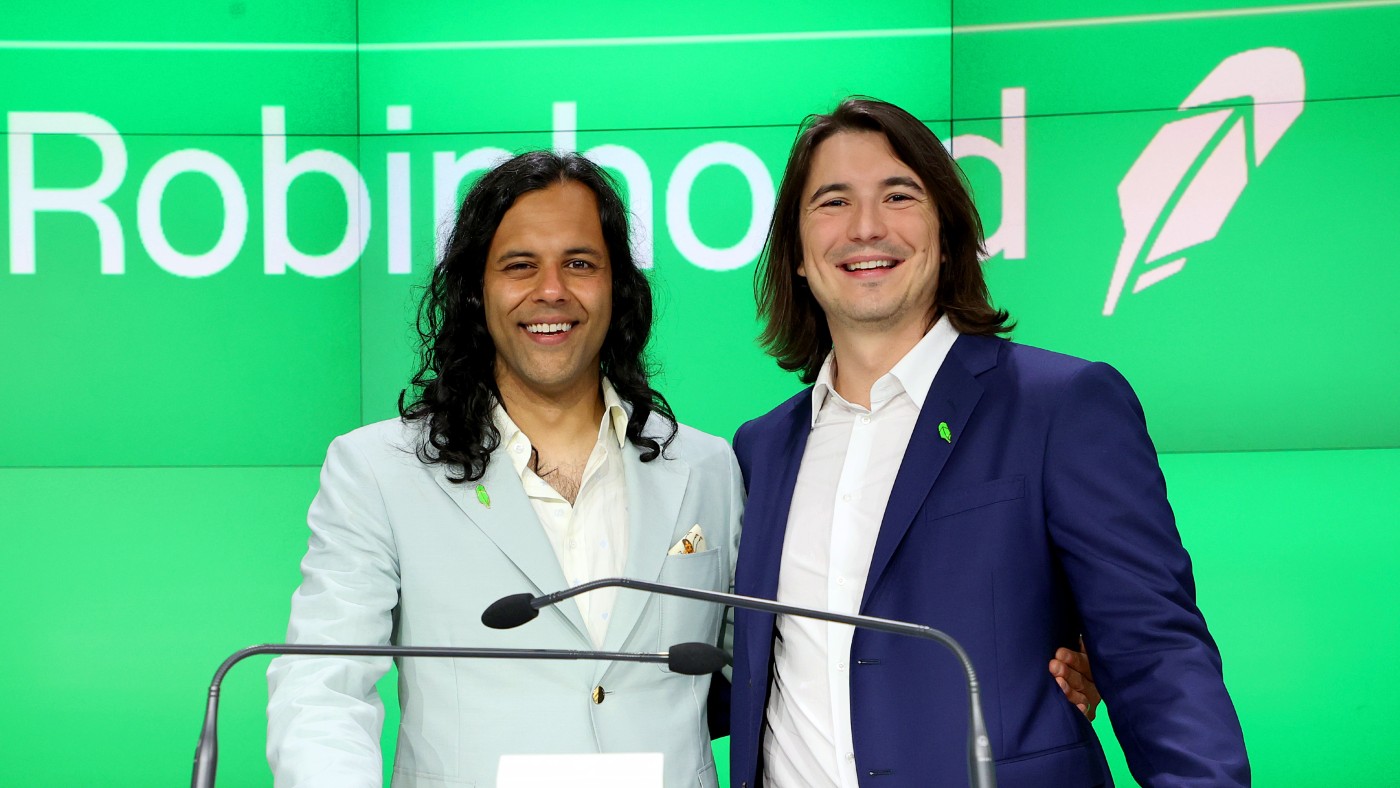Robinhood’s market debut: an ‘unconventional listing’
The disruptive app has hit the public markets it seeks to democratise. It could be a wild ride…

A free daily email with the biggest news stories of the day – and the best features from TheWeek.com
You are now subscribed
Your newsletter sign-up was successful
Robinhood marched its merry men to Wall Street last week in one of Nasdaq’s biggest IPOs in years, valuing the disruptive online brokerage at $32bn, said James Phillipps on Citywire. It was a fittingly “unconventional listing”: the company offered a third of its shares to its own customers. Hundreds of thousands signed up, only to see it flop. Shares fell by over 8% on the first day – a “limp opening” in “stark contrast” with Robinhood’s “stratospheric growth since the start of the pandemic”, during which it has “won over an army of fans, particularly among younger investors”, doubling its customer base to 31 million. Shares in the outfit, which offers equity, cryptocurrency and options trading as well as cash management, have since bounced back well above the $38 float price, said Maggie Fitzgerald on CNBC.com. They surged by more than 24% on Tuesday confirming, belatedly, the market’s faith in Robinhood’s mission “to democratise” finance.
The company, founded by Vlad Tenev and Baiju Bhatt in 2013, has “revitalised” a type of day trading last seen in the dotcom bubble at the turn of the century, said the FT. Robinhood’s pitch to investors – that everyone, not just the giants of Wall Street, should have access to the US stock market – has “become marketing folklore”. Investors on its app have sent stocks like Tesla, and cryptocurrencies such as dogecoin, to all-time highs – and brought discussion about financial markets “back to dinner tables across the US”. But its progress has also been “pockmarked by crisis and scandal”. Robinhood’s role in the January trading frenzy around the “meme stock” GameStop has come under congressional scrutiny. And it has faced fines and regulatory investigations for everything from lousy customer support to designing game-like features that inspire customers to compulsively check the app. “It’s easy to make positive speeches about democratising finance when everything is going up,” observes economist Patrick Krizan of Allianz. “It will be more interesting to see how people behave when we democratise the downturn.”
Perhaps Robinhood’s greatest contribution has been the “laudable” way it pioneered lower costs for investors, said The Economist. “For a time, the big retail brokers ignored the plucky upstart”, but after “a quick, brutal price war”, they all surrendered. There are plenty of caveats, said Matt Schifrin and Antoine Gara in Forbes. But “Robinhood’s long-term success and legacy” will depend on whether the good it is achieving – disrupting Wall Street and introducing millions of newcomers to investing – “outweighs the negative effects and risks”. The jury’s still out.
The Week
Escape your echo chamber. Get the facts behind the news, plus analysis from multiple perspectives.

Sign up for The Week's Free Newsletters
From our morning news briefing to a weekly Good News Newsletter, get the best of The Week delivered directly to your inbox.
From our morning news briefing to a weekly Good News Newsletter, get the best of The Week delivered directly to your inbox.
A free daily email with the biggest news stories of the day – and the best features from TheWeek.com
-
 What is the endgame in the DHS shutdown?
What is the endgame in the DHS shutdown?Today’s Big Question Democrats want to rein in ICE’s immigration crackdown
-
 ‘Poor time management isn’t just an inconvenience’
‘Poor time management isn’t just an inconvenience’Instant Opinion Opinion, comment and editorials of the day
-
 Bad Bunny’s Super Bowl: A win for unity
Bad Bunny’s Super Bowl: A win for unityFeature The global superstar's halftime show was a celebration for everyone to enjoy
-
 Currencies: Why Trump wants a weak dollar
Currencies: Why Trump wants a weak dollarFeature The dollar has fallen 12% since Trump took office
-
 Elon Musk’s starry mega-merger
Elon Musk’s starry mega-mergerTalking Point SpaceX founder is promising investors a rocket trip to the future – and a sprawling conglomerate to boot
-
 TikTok: New owners, same risks
TikTok: New owners, same risksFeature What are Larry Ellison’s plans for TikTok US?
-
 Will SpaceX, OpenAI and Anthropic make 2026 the year of mega tech listings?
Will SpaceX, OpenAI and Anthropic make 2026 the year of mega tech listings?In Depth SpaceX float may come as soon as this year, and would be the largest IPO in history
-
 Leadership: A conspicuous silence from CEOs
Leadership: A conspicuous silence from CEOsFeature CEOs were more vocal during Trump’s first term
-
 Ryanair/SpaceX: could Musk really buy the airline?
Ryanair/SpaceX: could Musk really buy the airline?Talking Point Irish budget carrier has become embroiled in unlikely feud with the world’s wealthiest man
-
 Powell: The Fed’s last hope?
Powell: The Fed’s last hope?Feature Federal Reserve Chairman Jerome Powell fights back against President Trump's claims
-
 Taxes: It’s California vs. the billionaires
Taxes: It’s California vs. the billionairesFeature Larry Page and Peter Thiel may take their wealth elsewhere